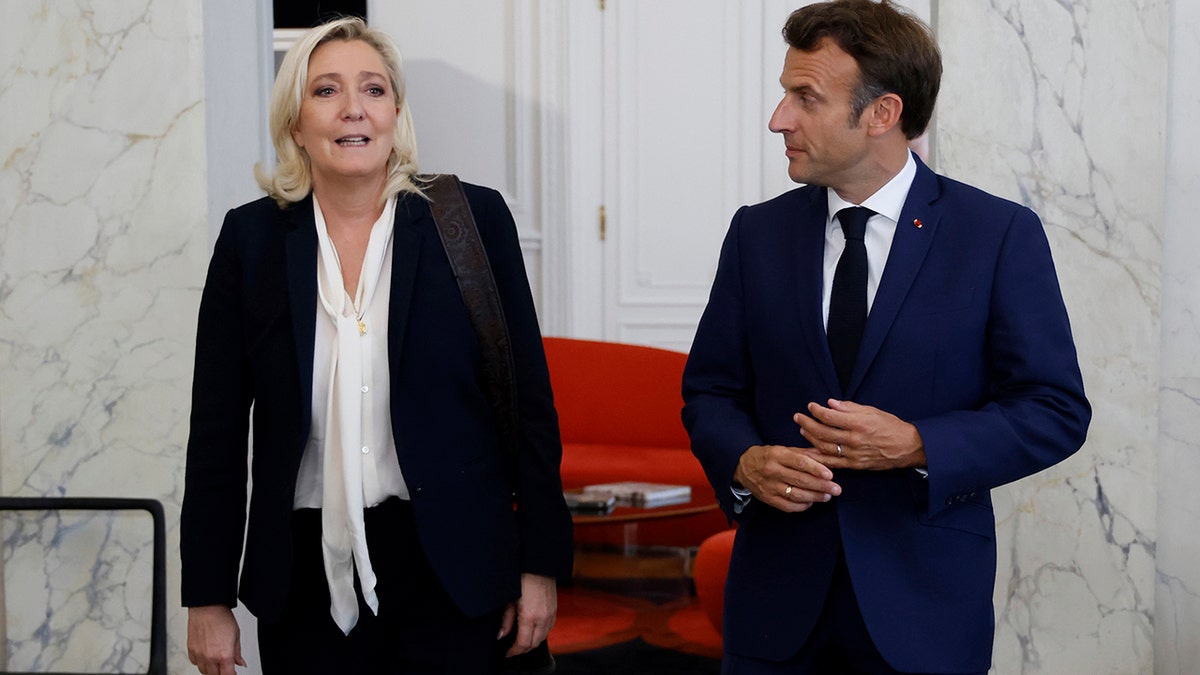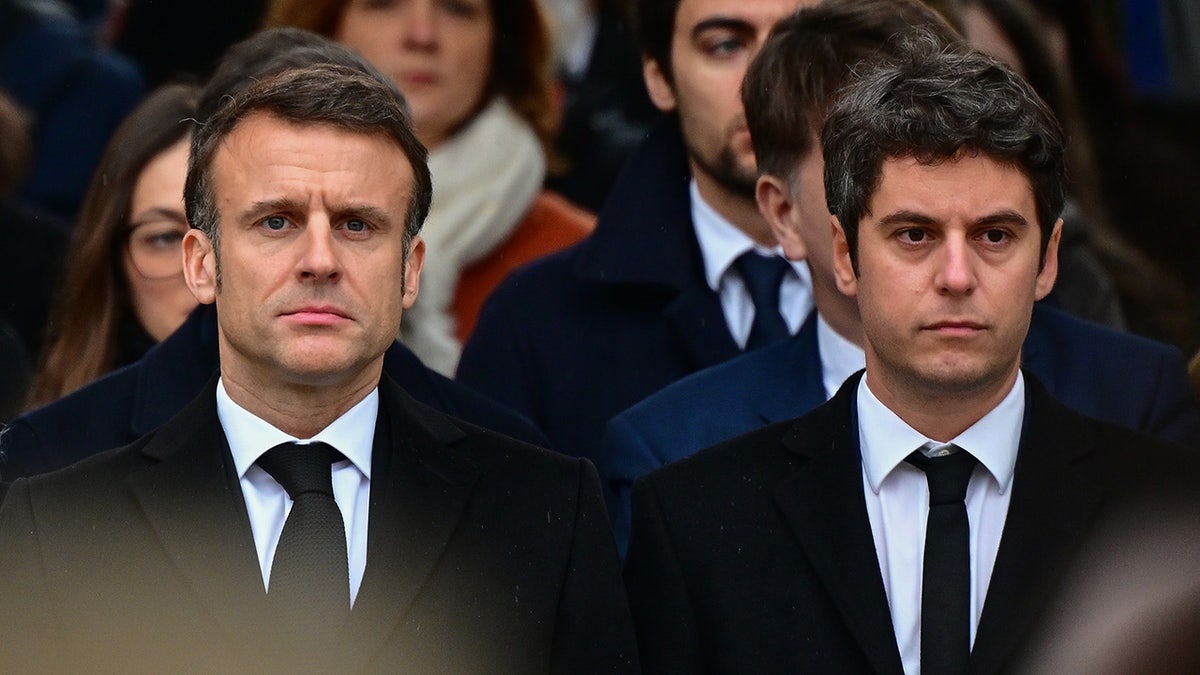INTERNACIONAL
Xenofobia, miedo y polarización marcan unas elecciones cruciales en Francia

Francia vota este domingo en la primera vuelta de elecciones legislativas inesperadas, que tienen el impacto de un comicio presidencial. Crece la posibilidad de una forzada cohabitación de la ultraderecha lepenista con el presidente Emmanuel Macron, el nuevo Nerón de la política francesa, después de la segunda vuelta del 7 de julio.
El presidente disolvió solitariamente la Asamblea Nacional, tras la derrota en los comicios europeos, en un partido de póker que va perdiendo. Su “acto de autodestrucción”, según sus propios pares, puede legitimar por primera vez al ex Frente Nacional de Marine Le Pen en el poder, que ha concretado su proceso de desdiabolización y es visto como un partido aceptable.
El Frente Popular, que reúne a la izquierda melenchonista, socialista, comunista y ecologista, no consigue aún construir una barrera del histórico francés “Voto Republicano”, por lo menos hasta ahora, para frenarlo.
Aparece incipiente un crecimiento del centro en las últimas horas para impedirle a Le Pen y su Reagrupación Nacional la mayoría absoluta. Pero podría verse ese fenómeno en el ballotage.
Racismo, antisemitismo y crispación
La liberación de la xenofobia entre los vecinos, el miedo de los que la sufren, como los extranjeros, los migrantes, los musulmanes y los binacionales, el antisemitismo y el odio al Islam son las características de esta campaña singular. El racismo y el antisemitismo se han deslenguado. Minan el país. Se han vuelto lastimosamente naturales. El ministro del interior Gerard Darmanin advirtió que puede haber violencia en la noche electoral.
“¿De dónde viene ese acento?” Es la pregunta más escuchada en las últimas horas en taxis, restaurantes, negocios o vecinos. El rechazo al extranjero, al migrante, al binacional se ha convertido en el corazón de la campaña, aunque Marine Le Pen quiera disimularlo. Son sus propios electores los que no pueden ocultar el alma del proyecto lepenista.
Hay temor en Francia, especialmente de los padres por sus hijos binacionales, que han heredado su nacionalidad con doble pasaporte. Ellos no podrán trabajar en lugares estratégicos del Estado, cuando la mayoría ha nacido aquí y ocupa cargos importantes en la estructura. No quieren que sus hijos sean ciudadanos de segunda categoría.
“Je partirai pas” es la canción de los xenófobos en esta campaña. Muestra como echan forzadamente a los extranjeros y migrantes de Francia. Lo la distribuido en las redes sociales el presidente del partido Reconquista, el xenófobo Eric Zemmour.
Testimonios
Un poster recorre las redes. Ahí esta Dalida, Marie Curie, Yanick Noha, Carla Bruni,Charles Aznavour. “Orgulloso de ser binacional», se lee. La doble nacionalidad es otro de los temores en esta campaña.
“Soy argentino, italiano y francés. No van a pasar. Voto Macron a fondo”, reconoce Enrique, un empresario argentino y trinacional en Francia.
Cristina es artista y tiene doble nacionalidad. “Vergüenza a Francia, tierra del saber. Como en la Alemania del 30. ¿Viste que cuando todo va bien, somos todos buenitos. Cuando las cosas van mal, el culpable es ‘el otro’: el judío, el extranjero, el negro, el musulmán, el Dawn. Igual, los jóvenes tienen menos miedo que nosotros. ¿Será inconsciencia?”, se pregunta la pintora, con nacionalidad holandesa y argentina, que vive en Francia.
Otro problema tienen los hijos de las colonias francesas. “Hablamos todos los días con mi marido y mis amigos”, cuenta una franco tunecina, que prefiere permanecer anónima y es mamá de dos hijos de 17 y 3 años.
 Marine Le Pen y el líder de su partido, Jordan Bardella, posibles ganadores en los comicios anticipados de este domingo en Francia. Foto: REUTERS
Marine Le Pen y el líder de su partido, Jordan Bardella, posibles ganadores en los comicios anticipados de este domingo en Francia. Foto: REUTERS «Enviar un partido de extrema derecha al poder va a legitimar esta sospecha constante de no pertenencia a Francia, cuando sos binacional o de origen extranjero. Yo no quiero que mis dos hijos sean ciudadanos de segunda, que los identifiquen por sus orígenes”, explica.
El Reagrupamiento Nacional va a eliminar el derecho al suelo, donde los hijos de extranjeros que nacieron en Francia pueden decidir su nacionalidad cuando tienen 13 o 18 años. Ni el régimen de Vichy se atrevió.
Qué dicen las encuestas
Dos días antes de las elecciones, la participación alcanzó el viernes su nivel más alto jamás, medido por el estudio diario Ifop-Fiducial para Le Figaro, LCI y Sud Radio. Exactamente el 67 por ciento, en un país donde no es obligatorio votar.
Para ganar una mayoría absoluta un partido necesita reunir a 289 de las 577 bancas que tienen la Asamblea Nacional. En ese caso sería inmediatamente gobierno.
 Carteles en París del Frente Popular, la alianza de izquierda que se presenta en las elecciones francesas. Foto: EFE
Carteles en París del Frente Popular, la alianza de izquierda que se presenta en las elecciones francesas. Foto: EFE Mientras la “unión de derechas” liderada por la Reagrupación Nacional -y reforzada por 62 candidatos “ciotistas” de los conservadores Republianos – se vio sacudida por la polémica por la prohibición de ciertos “trabajos extremadamente sensibles” para ciudadanos binacionales, la opinión pública parece apoyarlos. Con un aumento del 36,5% (+0,5), el bloque lepenista alcanzó un nuevo récord.
Gracias a este aumento de dos puntos y medio en una semana, el “campo nacional” -como se definen- recaudaría entre 225 y 265 (+5) asientos. Incluyendo 20 a 25 (+10 a +5) para el cuestionado jefe republicano Éric Ciotti. Consecuencia: el partido lepenista y sus aliados están más cerca que nunca de obtener la mayoría absoluta tras la segunda vuelta del 7 de julio.
Reunida bajo la bandera común del Nuevo Frente Popular, a pesar de profundas diferencias, la izquierda se estanca en el 29% de los votos. Suficiente para permitirle contar con entre 170 y 200 bancas, diez menos que el sondeo del jueves.
“Según nuestras estimaciones, que hay que tomar con cautela, 90 escaños podrían ir a Francia Insumisa, 50 al PS, 35 a los Verdes y 10 al partido comunista”, afirma el director de la división de política y noticias de Ifop, François Kraus. Cabe señalar también que la etiqueta “izquierda miscelánea” ganaría entre 10 y 18 diputados (+5 a +9).
El macronismo, en tercer lugar
Aún aturdido por la disolución y la bronca contra el presidente, el bando de Macron está por terminar tercero. La mayoría saliente, en cualquier caso, cerró la semana a la baja, con un 20,5% (-0,5). Lanzado a la batalla con 250 diputados salientes, el «bloque central» -como también se define- podría salvar entre 70 y 100 diputados. Apenas representaría un tercio del actual contingente macronista.
En cuarto lugar, Los Republicanos intentan por todos los medios encontrar la manera de sobrevivir. Dos semanas y media después del terremoto provocado por su presidente Éric Ciotti y su “alianza con la Reagrupación Nacional”, la derecha finalizó la campaña recuperando tímidamente el color, con un 7% (+ 0,5). Esto le permitiría salvar entre 30 y 60 escaños de sus 62 diputados salientes.
En Francia, la elección es como una tempestad impredecible y temida. El protegido de Madame Le Pen, Jordan Bardella, de 28 años, podría ser inevitablemente instalado como primer ministro, trabajando incómodamente junto a un presidente , que detesta prácticamente todo lo que representa el lepenismo.
Podría haber ingobernabilidad porque los lepenistas buscan controlar con el presupuesto una esfera presidencial: la defensa y las relaciones exteriores. Francia parece prepararse para saltar a lo desconocido.
INTERNACIONAL
French election preview: Polls show right-wing party leads runoff as opponents urge tactical voting

France is set to elect the right-wing National Rally (RN) as the largest party in government, yet no party may emerge with a clear majority in this tightly contested election as the second round of voting kicks off this weekend.
The first round, which occurred June 30, resulted in just 76 of the 577 constituencies in the French National Assembly determining their representative. Any candidate who did not receive an outright majority in the first round of voting heads on to the second-round runoff, which is set for July 7.
Those few contests that concluded in the first round revealed a lot about voter sentiment and indicated trouble for the current government after RN took one-third of the vote, the most by any party.
The current government is an «ensemble,» a coalition of parties, including French President Emmanuel Macron’s Renaissance (RE), Democratic Movement, Horizons, En Commun and the Progressive federation. Despite the assembly election results, Macron will retain his mandate as president until the 2027 election.
FRANCE’S RIGHT-WING NATIONAL RALLY LOOKS TO SEIZE ON RECENT ELECTORAL GAINS
Macron called the snap election after RN scored enormous success in the European Parliamentary elections in June. Polling before the first round of voting indicated RN would continue to dominate, but more recent polling ahead of the runoff indicates those returns have diminished and RN will fall short of a clear majority.
Wednesday’s poll indicates RN will end up taking between 190 and 220 seats, but it would need 289 seats to control the assembly, according to Reuters. Additionally, its closest ally, the Republicans, are projected to win – at most – around 50 seats, ruling out some kind of right-wing coalition to take control of the assembly.
Supporters of French far-right leader Marine Le Pen react after the release of projections based on the actual vote count in select constituencies June 30, 2024, in Hénin-Beaumont, northern France. (AP/Thibault Camus)
The next largest share would go to the New Popular Front alliance, which could net between 159 and 183 seats, leaving Macron’s ensemble third with around 110 to 135 seats. Macron has already ruled out making a new alliance with the left-wing party France Unbowed (LFI), according to French daily Le Figaro.
Many candidates from Macron’s alliance who reached the runoff have already stood down in an effort to focus voters and support behind the strongest non-RN candidate in any given constituency. Former French Prime Minister Edouard Phillippe told French network TF1 TV he would vote for a Communist candidate to stop RN from winning the seat.
FRANCE’S GOVERNMENT SPOKESPERSON IS ATTACKED ON CAMPAIGN TRAIL, DAYS BEFORE DECISIVE ELECTION
Macron insisted, however, that «withdrawing today for left-wing elected officials in the face of National Rally does not mean governing tomorrow with LFI.»
French Prime Minister Gabriel Attal last month blasted LFI as equally extreme and just as dangerous to French society as RN, writing on social media platform X that «Insoumise France fuels the National Rally and the National Rally fuels Insoumise France.

French President Emmanuel Macron, right, meets French far-right National Rally leader Marine Le Pen at Élysée Palace June 21, 2022, in Paris. (Ludovic Marin/Pool/AP)
«They fuel hatred, fears and divisions between the French,» Attal added. «On June 30 and July 7, against the extremes and for the Republic, vote!»
Opposition to RN stems from its roots as National Front, headed up by Marine Le Pen’s father Jean-Marie Le Pen, who was repeatedly convicted for racist and antisemitic remarks, including elements of Holocaust denial, such as when he referred to Nazi gas chambers as a «detail» of history.
RIVALS MOVE TO BLOCK FRANCE’S RIGHT-WING NATIONAL PARTY’S ELECTION MOMENTUM
But Marine Le Pen has found support among some of France’s Jewish voters as antisemitism continues to grow in Europe.
Her anti-Islam views and comments, however, have raised concerns among other voters, as well. In 2017, she suggested France expel any foreigners convicted of a crime or suspected of being radicalized and said convicted extremists with dual nationality should be stripped of their French passports, Radio France Internationale reported.
«The measures that I want to put in place would mean that many of these people (Islamist attackers) would not have been on our territory or living freely,» she said in an interview with BFM TV.

French President Emmanuel Macron and French Prime Minister Gabriel Attal during the national tribute ceremony for former French Justice Minister Robert Badinter at Place Vendome Feb. 14, 2024, in Paris. (Christian Liewig/Corbis/Getty Images)
In the event the votes should fall as the polls predict, the most likely outcome for France will be a hung parliament with some kind of begrudging alliance created to get a leader in place. The Conservative Party in Britain regained power from Labour in 2010 through a hung parliament alliance with the Liberal-Democrats, ultimately establishing an outright majority in the following election.
But, at that time, the Conservatives had 306 of 650 seats, making it far easier to broker such a deal. For France, RN would need support from two other parties or would need to form some kind of alliance with a direct rival.
The government has urged voters to do what they can to continue diminishing RN’s chances of achieving control of the assembly, with Attal arguing voters had a «responsibility» to block RN from victory.
CLICK HERE TO GET THE FOX NEWS APP
«On Sunday evening, what’s at stake in the second round is to do everything so the extreme right does not have an absolute majority,» Attal said during an appearance on France Inter radio as reported by Voice of America.
«It is not nice for some French to have to block … by using a vote that they did not want to,» he added, clarifying that he «did not speak about a coalition. I do not want to impose on the French a coalition they did not choose.»
-
POLITICA2 días ago
Tras romper con Macri, Patricia Bullrich negó su salida del PRO: “Ni loca me voy, nos quedamos”
-
POLITICA2 días ago
Guillermo Francos dijo que Sergio Massa “trabaja para generar inestabilidad en el Gobierno”
-
POLITICA3 días ago
El Gobierno acusó a “operadores” por la suba del dólar blue y volvió a defender el plan económico
-
ECONOMIA2 días ago
La inflación de junio rondaría el 5,2% según los analistas consultados por el Banco Central
-
POLITICA21 horas ago
El Gobierno busca bajar la tensión con el PRO y dice que cumplirá el fallo por la coparticipación a la Ciudad que reclamó Macri
-
SOCIEDAD2 días ago
Caso Loan: Camila declaró por más de cinco horas y al salir pidió que encuentren al nene






























